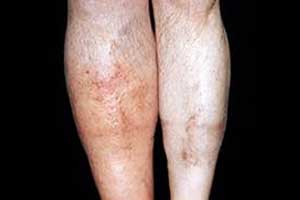- Home
- Editorial
- News
- Practice Guidelines
- Anesthesiology Guidelines
- Cancer Guidelines
- Cardiac Sciences Guidelines
- Critical Care Guidelines
- Dentistry Guidelines
- Dermatology Guidelines
- Diabetes and Endo Guidelines
- Diagnostics Guidelines
- ENT Guidelines
- Featured Practice Guidelines
- Gastroenterology Guidelines
- Geriatrics Guidelines
- Medicine Guidelines
- Nephrology Guidelines
- Neurosciences Guidelines
- Obs and Gynae Guidelines
- Ophthalmology Guidelines
- Orthopaedics Guidelines
- Paediatrics Guidelines
- Psychiatry Guidelines
- Pulmonology Guidelines
- Radiology Guidelines
- Surgery Guidelines
- Urology Guidelines
Immediate compression prevents complications in DVT

Immediate compression should be offered to all patients with acute deep venous thrombosis of the leg irrespective of the severity of complaints, reports a study published in the journal Blood.
Immediate compression therapy after deep venous thrombosis is associated with a 20% absolute reduction of residual vein occlusion and the reduction of residual thrombosis is associated with an 8% absolute reduction of the post-thrombotic syndrome at 24 months.
Elham E. Amin et al. conducted a study to investigate whether compression therapy immediately after diagnosis of deep vein thrombosis affects the occurrence of residual vein obstruction, (RVO) and whether the presence of RVO is associated with the post-thrombotic syndrome and recurrent venous thromboembolism.
Residual vein occlusion -- when clots persist in veins with or without symptoms -- is thought to be a contributing factor in the development of post-thrombotic syndrome, a collection of persistent and often debilitating symptoms that can greatly diminish a person's quality of life, including pain, swelling, and discoloration and scaling in the affected leg.
The investigators studied nearly 600 DVT patients who received compression therapy that began within 24 hours of diagnosis compared to patients that started compression therapy at a later point in time. Compression therapy was randomly administered using multilayered bandaging or compression hosiery until edema were reabsorbed, at which time all patients wore fitted compression stockings. In addition to compression, patients also received anticoagulants.
Read Also: Rivaroxaban -New treatment for DVT in cancer patients
The researchers found that patients who received immediate compression therapy were 20 percent less likely to develop residual vein occlusion and 8 percent less likely to suffer post-thrombotic syndrome compared with those who did not receive immediate compression.
Compression therapy was not associated with any adverse side effects. Patients with a blood clot lower in the leg appeared to benefit from compression to a greater extent than those with a blood clot higher in the leg.
“Compression therapy is thought to improve blood flow by reducing the diameter of veins so that blood is pushed through them more forcefully, helping to clear clot material, said Dr. Ten Cate-Hoek, the senior study author.
DVT occurs when a blood clot forms in a deep vein, commonly in the legs and the condition carries a high risk of recurrence, death, or chronic debilitating symptoms such as pain and swelling.

Disclaimer: This site is primarily intended for healthcare professionals. Any content/information on this website does not replace the advice of medical and/or health professionals and should not be construed as medical/diagnostic advice/endorsement or prescription. Use of this site is subject to our terms of use, privacy policy, advertisement policy. © 2020 Minerva Medical Treatment Pvt Ltd